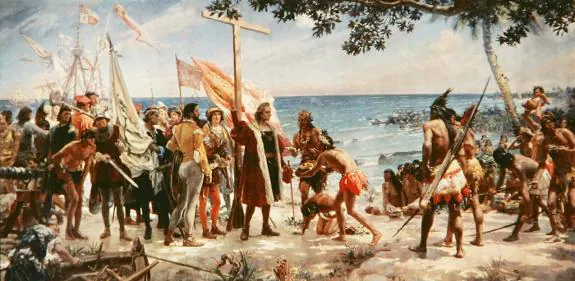

Secciones
Servicios
Destacamos

Debbie Bartlett
Friday, 17 April 2020, 13:32
On 17 April 1492, Christopher Columbus achieved the first step towards his dream of setting off westwards to find a quicker route to the Maluku Islands, a trading centre for spices, when the voyage for which the Portuguese king had refused funding was approved by the Catholic Monarchs of Spain, Ferdinand and Isabella.
Columbus had approached the Spanish monarchs in 1486, and they finally signed the contract, known as the 'Capitulaciones', in the town of Santa Fe, near Granada, nearly six years later. Under it, he was appointed admiral, viceroy and governor of the lands he discovered and was entitled to ten per cent of profits from "every kind of merchandise, whether pearls, precious stones, gold, silver, spices, and other objects and merchandise whatsoever, of whatever kind, name and sort, which may be bought, bartered, discovered, acquired and obtained within the limits of the said Admiralty".
The Capitulaciones also stated that he would spread the word of God in his travels.
Columbus didn't waste any time. He set off on this voyage from Palos de la Frontera, in Huelva province, on 3 August. There were 90 men on three ships: the Pinta and the Niña, both small caravels, and the larger Santa María.
He didn't achieve his aim of reaching the spice islands on this unusual route, but arrived instead on an island in the Bahamas that he called San Salvador; the natives had called it Guanahani. The land was first sighted on 12 October, reportedly by a sailor on board the Pinta, although Columbus apparently claimed he had done it, to avoid having to pay the reward he had promised the crew for being the first to do so.
After reaching Cuba on 26 October, which Columbus thought was China, the ships arrived at the island of La Española (the natives called it Haiti) on 5 December.
On the 25th, the Santa María ran aground and had to be abandoned, and the others set sail for Spain on 16 January, finally arriving back via Portugal in early March.
Publicidad
Publicidad
Publicidad
Publicidad
Esta funcionalidad es exclusiva para registrados.
Reporta un error en esta noticia

Debido a un error no hemos podido dar de alta tu suscripción.
Por favor, ponte en contacto con Atención al Cliente.

¡Bienvenido a SURINENGLISH!

Tu suscripción con Google se ha realizado correctamente, pero ya tenías otra suscripción activa en SURINENGLISH.
Déjanos tus datos y nos pondremos en contacto contigo para analizar tu caso

¡Tu suscripción con Google se ha realizado correctamente!
La compra se ha asociado al siguiente email
Comentar es una ventaja exclusiva para registrados
¿Ya eres registrado?
Inicia sesiónNecesitas ser suscriptor para poder votar.